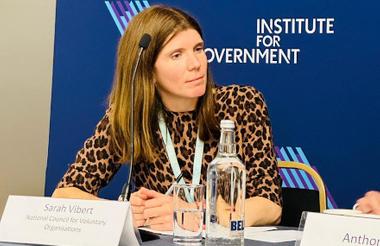Charities are handing back public contracts that do not cover the full cost of delivering their services, the chief executive of NCVO has said.
Speaking at a Labour Party conference fringe event hosted by the Institute for Government, Sarah Vibert said recent NCVO research showed four in five charities had subsidised their public contracts at some point.
She said charities were often treated by commissioners as the “cheapest alternative or last-ditch safety net” and urged a Labour government to uplift public contracts to cover the full costs.
Four in five charities subsidising public contracts
Last month, NCVO surveyed 346 of its charity members on the impact of inflation on their services.
Two in five said the value of their contract had never covered the true cost of delivering the services they provide.
Four in five of the sample said they subsidise public services with charitable funding such as donations or reserves.
Vibert said this subsidising of public contracts is “completely unsustainable” and that NCVO has seen charities “handing back contracts, often after decades delivering a contract to the community.”
This has meant that beneficiaries have not been supported or the quality and safety of public services has been compromised, she said.
Charities seen as ‘cheapest alternative’
Charities have a vital role in public services but are often treated as the “cheapest alternative or last-ditch safety net”, Vibert said.
She said the public services that charities provide are “value for money” in terms of the outcomes they provide but are not necessarily the lowest cost.
“The problem is that charities are often treated as the cheapest alternative or a last-ditch safety net, because commissioners know that charities often won't walk away from the communities that they serve, and they know that these people have nowhere else to turn,” she said.
“Compounding this is the need for investment in and reform of public services. After a decade of austerity, charities have become the sticking plasters of the state.”
Staff could ‘get paid more in Tesco’
Charities deliver around £15.8bn of public services but this is “hugely undervalued and underpaid”, Vibert said.
Vibert said charities struggle to recruit and retain staff who could “get paid more in Tesco” and those that do stay working in charities “are burned out through the pressure of rising demand.”
Vibert said: “A future Labour government must invest in public services and contracts and uplift those contracts to cover their true cost.
“We shouldn't underestimate the level of challenge after a decade of austerity. And really think about people and purpose first.
“Sometimes that might be insourcing [public services], but often that will mean outsourcing to the right provider that really understands communities and can deliver that outcome based on the information that I mentioned.
“What I think government, the private sector and voluntary sectors need to do is really put people in communities into the focus and bring together the strengths that all of us can bring to public service.”












